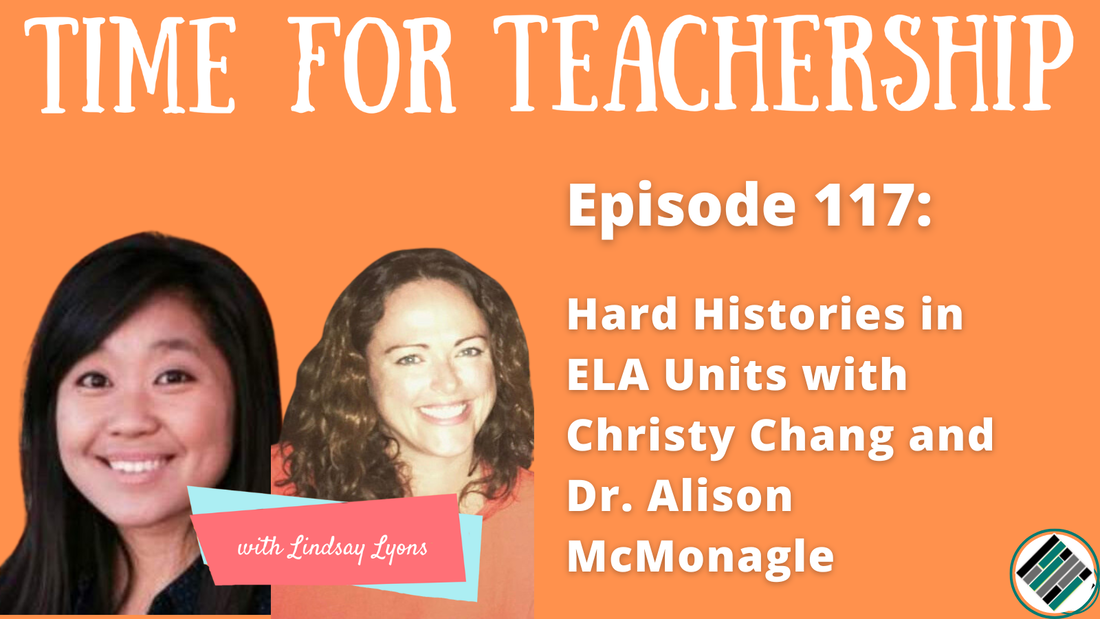
Listen to the episode by clicking the link to your preferred podcast platform below:
I met today’s guests at the 2022 NCSS Conference when I attended their session on elevating and prioritizing teaching hard histories in the ELA classroom. Both curriculum specialists for the school district of Philadelphia—which includes about 250 schools—Christy primarily works with middle schools and Alison primarily works with high schools.
The Big Dream Christy’s dream is that all students can access grade level texts, and they are on the way to achieving that dream soon! In addition to Christy's dream, Alison’s dream is autonomy for students and teachers to make the best choices for their needs. Alignment to the 4 Stages: Mindset, Pedagogy, Assessment, and Content The culture of partnership seems to be in place in many places. Leaders share the vision of partnership. Sometimes it doesn’t happen in the way it’s envisioned. Paraphrasing Dr. Ibram Kendi, Christy shared that racist policies lead to individual racism, not the other way around. The hope is personal mindsets will shift when we introduce new curriculum and have honest conversations as educators wrestle with it. There is a legacy of heavy-handedness around pedagogical practices, so there is a bit of fear around having the autonomy to do things differently than they’ve been done in the past. Another tension is due to emergency certifications and the larger context of teacher training, teachers may not have been equipped with the tools they need to be culturally responsive to the needs of their students. Christy shared an analogy: We’re not trying to give people overwhelm with a bunch of dieting recommendations, we’re saying eat nourishing meals and eat a walk every day. We’re not inventing something brand new. We’re trying to take away some things that were added to teachers’ plates that were not helping teachers and students. Action Steps The simplified goal: Read good books. Talk about them. Write about them. Curriculum Created: For each unit, we share a core text and provide daily lesson guidance documents, which includes core components of a reading or writing lesson. Each unit comes with an overview, which includes Essential Questions, big ideas, and alignment to Dr. Gholdy Muhammad’s HILL model (5 pursuits). Step 1. Try to align ELA novels and texts to grade-level History units and content. Step 2. Choose culturally relevant texts. Choose one canonical text and teach it critically. Step 3. Develop lesson guidance, not lesson plans. (This enables teacher autonomy and offers opportunities for personalization in response to students’ identities in each classroom.) Lesson guidance includes things like: an opening, mini lesson, shared reading, discourse, write in response to reading). Step 4. Develop a writing-based summative assessment (multimodal writing or traditional writing). Recommendations for Leaders Doing Similar Work An Approach to Implementation Challenges: Particularly in high school, teachers are often attached to the texts they’re teaching. There’s some sticky spaces around that. They’ve pushed it back to schools to determine what they were comfortable with and what their students needed with the lens of Am I just falling back on what I know? Am I pushing myself? They’ve learned to trust schools and leaders to make those decisions and honestly communicate when that’s a struggle. Being open to the conversation is critical. Not Starting From Scratch? If you’re working with existing resources, there is still room for shifts. ”We think that novel-based units are the way to go…We start with the premise that there is no wrong text to teach in a classroom. It’s how you teach it.” We have to work within our locus of control. For example, if there’s a short story with problematic messaging, relate it to the identities present in the classroom (the teacher’s and the students’ identities), and determine how to talk about the text. Positive Deviance: Parable of the Sower and Sula units were made and previously taught by teachers prior to this district-wide curriculum design work. These units were already received well, so it became part of the standard curriculum. In fact, all units were designed by teachers and coaches in the district, which helped build trust in the curriculum. Book “Home Runs” for Students: The Poet X by Elizabeth Acevedo and Born a Crime by Trevor Noah One Step to Get Started Shift conversations about ELA instruction to building knowledge. Books teach us about the world. What knowledge are we choosing to build? How is that built by the books we teach? Skills are very important to reading and writing, but without knowledge, they are kind of useless. There’s a lot of research on this coming out now! Stay Connected You can connect with Christy via email at [email protected]. You can find Alison on LinkedIn. You can also find the School District of Philadelphia’s secondary ELA curriculum here. To help you begin to think about leading teams to create new curriculum, I’m sharing my Curriculum Boot Camp Planner with you for free. And, if you’re looking for more details on the ideas in this blog post, listen to episode 117 of the Time for Teachership podcast. If you’re unable to listen or you prefer to read the full episode, you can find the transcript here. Quotes:
If you enjoyed this episode, check out my YouTube channel where I explain how to talk about current events with your staff:
0 Comments
Leave a Reply. |
Details
For transcripts of episodes (and the option to search for terms in transcripts), click here!
Time for Teachership is now a proud member of the...AuthorLindsay Lyons (she/her) is an educational justice coach who works with teachers and school leaders to inspire educational innovation for racial and gender justice, design curricula grounded in student voice, and build capacity for shared leadership. Lindsay taught in NYC public schools, holds a PhD in Leadership and Change, and is the founder of the educational blog and podcast, Time for Teachership. Archives
May 2024
Categories |

 RSS Feed
RSS Feed